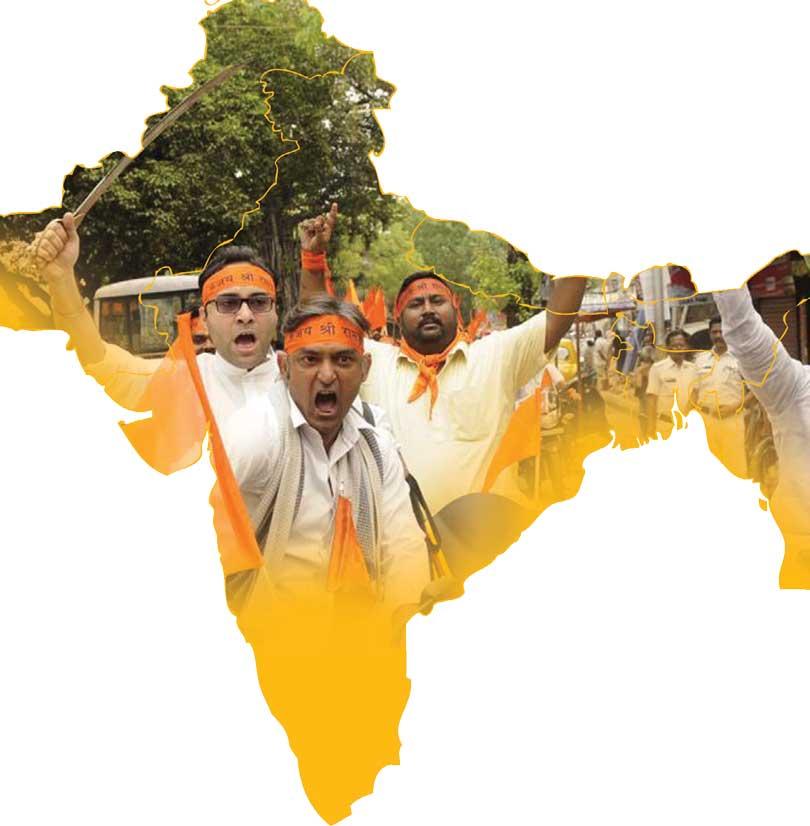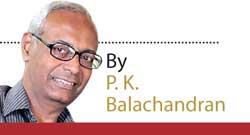11 Jun 2019 - {{hitsCtrl.values.hits}}

Hindutva brigade displays its power in West Bengal
 The Eastern Indian State of West Bengal, which has been a stronghold of the secular Centre-Left/Left Wing parties from the time India gained independence in 1947, is now experiencing a non-secular Right Wing surge.
The Eastern Indian State of West Bengal, which has been a stronghold of the secular Centre-Left/Left Wing parties from the time India gained independence in 1947, is now experiencing a non-secular Right Wing surge.
There is every possibility of the Right Wing “Hindutwite” Bharatiya Janata Party (BJP) capturing power in West Bengal through the next State Assembly elections due in 2021.
It was the April-May 2019 parliamentary elections which showed the new trend. The tally of the BJP-led National Democratic Alliance (BJP-NDA) in the parliamentary elections in West Bengal went up from two out of 42 seats in 2014 to 18 out of 42 in the 2019 polls. The tally of the Centre-Left Trinamool Congress (TMC) led by Chief Minister Mamata Banerjee went down from 34 out of 42 to 22 out of 42. The vote share of the BJP-led NDF went up from 17% in 2014 to 40.25%. The TMC was only slightly ahead with 43%.
Charges of political violence are now being slapped against the TMC government. These sound ominous in the context of the emergence of the BJP-NDA as an unassailable power in the Central government following the April-May parliamentary elections. There is even talk of President’s rule being imposed on West Bengal and the State Assembly elections being advanced to 2020 to take advantage of the prevailing anti-TMC/Congress/Left sentiment in the State.

Last week, three BJP workers and a TMC supporter were killed in Bhangipara village in the 24-Parganas district. Not surprisingly it was a communal clash also, as the TMC worker killed was a Muslim and the BJP dead were Hindu.
In the run up to the General Elections, the BJP claimed that 130 of its supporters were killed while during the elections 12 lost their lives in poll-related violence
As expected, the BJP-led government at the Centre sought a Situation Report from the West Bengal government, a step which could be viewed as the first towards the imposition of Central or Presidential rule.
Chandra Kumar Bose, vice president of BJP’s West Bengal wing has said the party’s focus ahead of the State Assembly elections would be on the restoration of Rule of Law and the identification of “illegal infiltrators from Bangladesh through the controversial National Register of Citizens.
The BJP’s electoral promise to identify “illegal Bangladeshi Muslim migrants” was a crucial factor in ensuring its victory in the border districts and North Bengal. The party claims that more than 15 million illegal immigrants from neighbouring Bangladesh are in West Bengal.
That the BJP is shaking the TMC is evident from the fact that more than 60 Local Body level Councilors from the TMC camp as well as some Members of the Legislative Assembly (MLAs) belonging to the TMC and other parties have defected to the BJP.
Poison of divisive politics
Reacting to the adverse situation, anti-BJP West Bengal intellectuals are to launch a citizens’ movement to curb the “poison of divisive religious politics” in West Bengal. CM Mamata Banerjee has dubbed Hindutvaas “alien to Bengali culture.”
Harvard History Professor Sugata Bose, has proposed the formation of an apolitical secular and liberal citizens’ forum that would be rooted in Bengal’s great liberal and secular intellectual and political tradition.
Bose told the media that the movement against Hindutva should be driven by the cultural ethos of renowned Bengali poets like Rabindranath Tagore and Kazi Nazrul Islam and the political legacy of Deshabandhu ChittaranjanDas and Nethaji Subhas Chandra Bose. Bose said that Nobel Laureate Amartya Sen is “very concerned” about the possible extinction of secularism in West Bengal politics.
For her part, CM Mamata Banerjee has called for the setting up of two cadre-based organizations: the male organization to be called Jai Hind Bahini and the women’s group will be called Banga Lallona Bahini. These organizations will counter the RSS and BJP with “Bengali culture” and educate the people about the dangers of the BJP’s divisive religious politics.
“Bengali cultural traditions run very deep. Our Muslim brothers fought Pakistan with Tagore and Nazrul Islam on their lips in 1971. It is time we did the same here now,” singer Suchetona Majumder, a specialist in Rabindra Sangeet, told Subir Bhaumik of ‘South Asian Monitor’
.
Bengal’s liberal and secular intelligentsia largely supported the Left until many of them shifted allegiance to Mamata’s Trinamool which displayed a more pronounced Bengali ethos, Bhaumik recalls.
Many Bengalis have memories of partition-time in 1947 when Bengal was divided into a largely Hindu West Bengal and a largely Muslim East Pakistan (which eventually became Bangladesh in 1971).
According to Bhaumik, political commentator Sukhoranjan Dasgupta said that Bengalis don’t want divisive religious politics again and novelist Samaresh Majumder said that Bengali culture is syncretic with a mixture of the Hindu and Muslim.
The shrill anti-Bangladesh rhetoric of the BJP and threats to implement the National Register of Citizens or NRC in West Bengal have not gone down well with many Bengalis observes Subir Bhaumik.
“That it has led to the exclusion of nearly four million Bengalis, more Hindus than Muslims, in Assam, is something Mamata Banerjee seems destined to play up as she prepares to resist any imposition of NRC on West Bengal,” Bhaumik adds.
Any attempt to push the four million so-called Bangladeshis from Assam and 15 million from West Bengal to Bangladesh will spoil the current good relations with Bangladesh, he warns.
BJP supporter and top model PayelRohtagi’s description of Raja Ram Mohan Roy, the father of Bengal renaissance, as a “British stooge” created a furore in West Bengal.
Hindutwa; not alien to Bengal
However, pro-BJP commentator, Swapan Dasgupta says that contrary to the leftist/elitist view, Bengal has been traditionally hospitable to pro-Hindu and Right Wing politics.
Writing in The TelegraphDasgupta says: “From the 19th to the mid-20th century, in the period that witnessed the birth and the flowering of Indian nationalism, Hindu-ness was an important current in Bengal’s intellectual thought and politics. Most nationalist thinkers were concerned with trying to come to terms with the reasons for the loss of national sovereignty and exploring ways of overcoming it. In this scheme of things, the reform and re-crafting of Hindu society occupied a key position.”
“Tapan Raychaudhuri’s study of Bengal’s responses to the West in the 19th century dealt with three intellectual stalwarts - Bhudeb Mukherjee, Bankim Chandra Chatterjee and Swami Vivekananda. All three focused on issues that related to Hindus as Hindus. To them, modernity did not mean discarding the Hindu inheritance but reshaping the Hindu inheritance,”Dasgupta pointsout.
“In the realms of political activism too, the movement against the Partition of Bengal in 1905 had explicitly Hindu overtones, take Aurobindo Ghose and Bipin Chandra Pal as foremost examples. And this religio-political aspect was embraced by Rabindranath Tagore.”
“From the late 1920s till Independence, there was often very little to distinguish the Bengal Congress from the Hindu Mahasabha,” Dasgupta says.
“The Hindu Mahasabha boasted of the involvement of intellectual stalwarts such as Shyama Prasad Mookerjee, Nirmal Chandra Chatterjee and even RamanandaChatterjee. The pressure built up by Shyama Prasad was a key factor in ensuring that the Hindu majority districts of Bengal were not included in East Pakistan,” he adds.
However, with the death of Dr. Shyama Prasad Mookerjee in 1953 and the adoption of the parochial “Hindi-Hindu-Hindustan” slogan by the Hindu Right Wing then led by the Jana Sangh party, the Hindu Right Wing’s influence waned in West Bengal.
But now, the BJP is seen in West Bengal as a Hindu party which accommodates local identities, and therefore perfectly in tune with Bengal’s ethos based on Bengali-based Indian nationalism, Dasgupta feels.
26 Oct 2024 8 minute ago
26 Oct 2024 2 hours ago
26 Oct 2024 3 hours ago
26 Oct 2024 4 hours ago
26 Oct 2024 4 hours ago